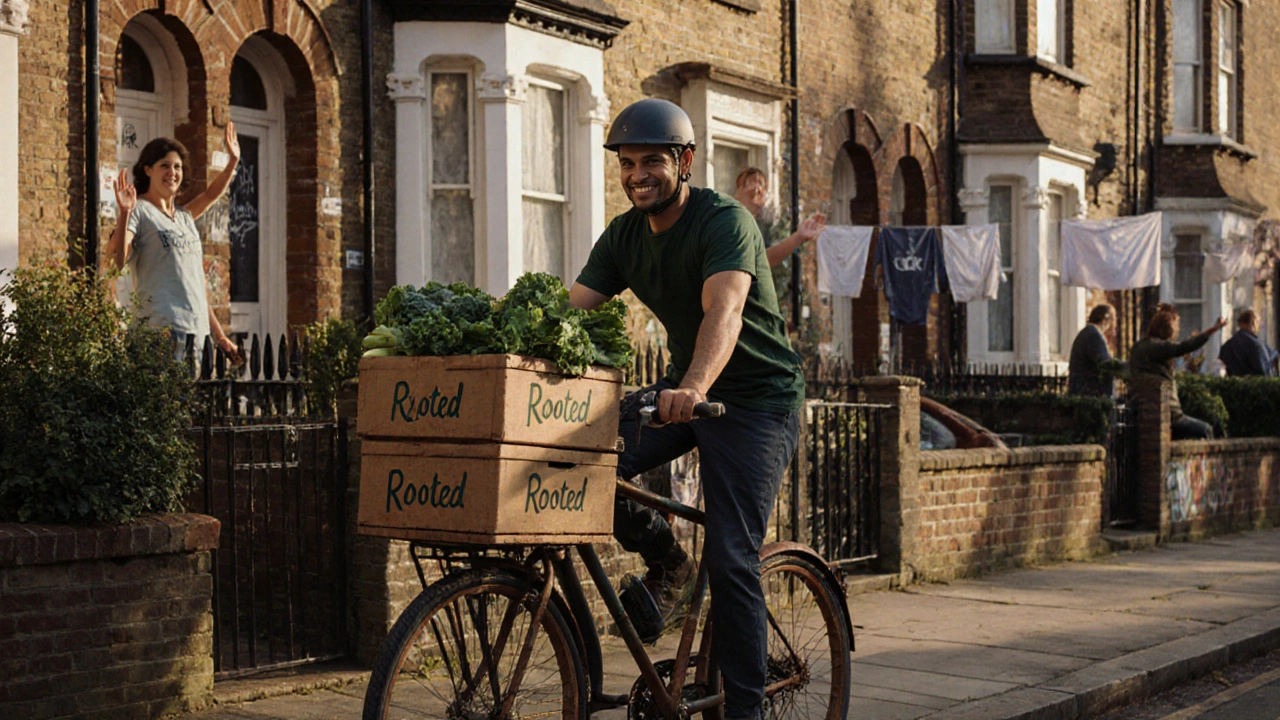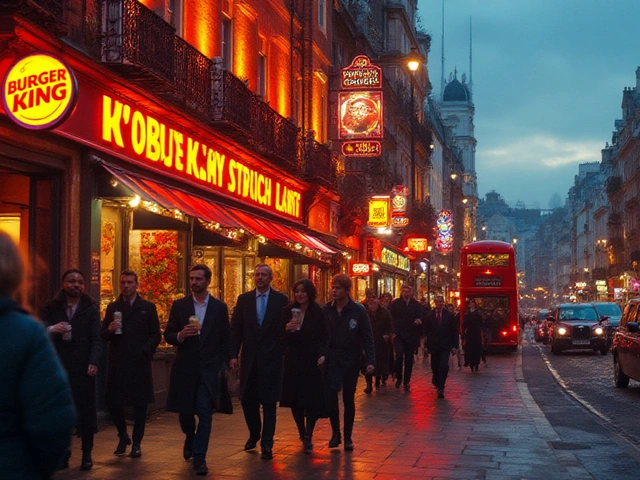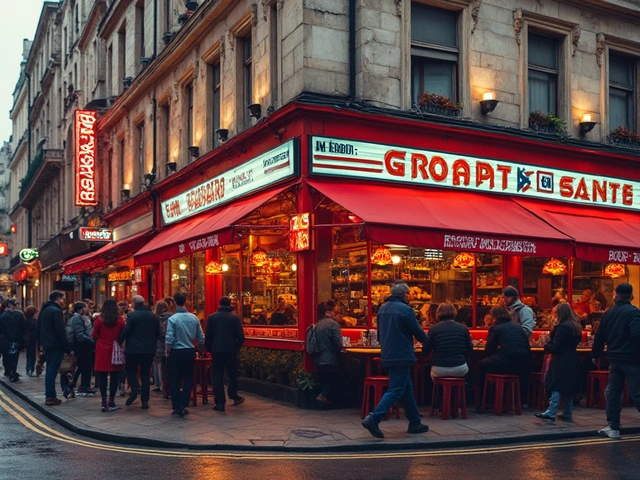
In London, where the Tube hums beneath historic streets and coffee shops in Shoreditch double as co-working hubs, the real innovation isn’t always in the headlines. While Silicon Roundabout gets the press, a quieter wave of startups is reshaping how Londoners live, work, and connect-without needing VC funding or a viral TikTok campaign. These are the hidden gems: small teams, local problems, and solutions built for the rhythm of this city.
London’s Underground Food Tech Revolution
Ever notice how hard it is to find fresh, affordable produce in a West London flat without a car? That’s where Rooted came in. Founded by two ex-supermarket managers in Brixton, Rooted delivers weekly boxes of surplus veg from farms in Kent and Essex directly to doorsteps in Barking, Croydon, and Ealing. No apps, no subscriptions-just a WhatsApp group and a bike courier who knows every back alley in SE5. They’ve cut food waste by 40% in their catchment area and now partner with 12 community centres to offer free boxes to low-income families. No funding rounds. No logos on buses. Just a spreadsheet, a van, and a mission to make London less wasteful.
The Quiet Fix for London’s Commute Stress
Commuting on the Elizabeth Line is a daily ritual for hundreds of thousands. But what if your train was late, and you needed to reschedule a meeting without opening five apps? Enter TimeBuffer, a tiny London-based tool built by a former TfL data analyst. It doesn’t track trains-it predicts how much extra time you actually need to get from King’s Cross to Canary Wharf, based on real-time weather, tube strikes, and even the day of the week. It’s free, no login required, and runs as a simple Chrome extension. Over 18,000 Londoners use it daily. No ads. No investors. Just a guy in a flat in Islington who got tired of being late.
Where the Art Scene Meets the Gig Economy
Camden’s street artists used to sell prints at markets or rely on gallery slots that took six months to book. Now, WallWander connects local painters directly with businesses looking for affordable, original murals. A café in Notting Hill might hire a muralist from Peckham to paint a wall for £800-half the cost of a traditional agency. The platform takes 10%, and the artist keeps the rest. Over 300 artists have joined since 2023. The most popular mural? A giant badger holding a cup of tea, painted on the side of a shop in Hackney. It’s now a photo spot. No PR team. No media coverage. Just a website, a PayPal link, and a shared love for London’s grittier corners.

Reinventing the Traditional Pub Experience
Pub culture in London isn’t dying-it’s evolving. In a basement beneath a 19th-century brick building in Bermondsey, Still & Stone runs a membership-only pub that doesn’t serve alcohol. Instead, it offers handcrafted non-alcoholic cocktails using British botanicals: elderflower from Kent, juniper from the Cotswolds, and smoked sea salt from Cornwall. The space feels like a classic pub-leather booths, wooden floors, a dartboard-but the menu reads like a tea sommelier’s dream. Over 1,200 members signed up in the first year. No marketing budget. Just word-of-mouth from yoga teachers, new parents, and sober curators who miss the vibe but not the hangover.
The Library That Doesn’t Lend Books
Not every startup needs tech. In a converted 1960s library in Southwark, StorySwap lets people exchange life stories instead of novels. Bring a 500-word personal essay-about losing your job, your first London flat, or your mum’s Sunday roast-and leave with someone else’s. No names. No dates. Just handwritten pages in a wooden box. The project started as a weekend stall at Borough Market. Now, it’s in 17 libraries across Greater London, including one in a refugee centre in Lewisham. The most shared story? A woman from Sierra Leone describing her first taste of a full English breakfast in 2012. It’s now displayed on the wall.
Why These Startups Fly Under the Radar
What makes these businesses different isn’t their tech-it’s their trust in London’s neighbourhoods. They don’t chase global scaling. They don’t pitch to Silicon Valley. They solve problems that only someone who’s been stuck on the District Line at 8:15 a.m. would even notice. They’re built on local knowledge: the way Camden Market smells on a rainy Tuesday, the exact time the 27 bus runs late in Peckham, the quiet pride of a South London mum who makes her own jam.
These aren’t unicorns. They’re sparrows. Small. Persistent. Hard to spot unless you’re looking closely. And that’s why they work.

How to Find More Hidden Gems in London
Want to discover more of these quiet innovators? Here’s how:
- Walk through markets like Broadway Market, Maltby Street, or Columbia Road on a Sunday. Talk to stallholders-they often run side projects.
- Check out Londonist’s ‘Local Heroes’ section. It’s not flashy, but it’s real.
- Join a local Facebook group like ‘Hackney Independent Businesses’ or ‘South London Foodies.’
- Visit a library that’s not a tourist spot-like the one in Woolwich or Haringey. They often host community startups.
- Ask a barista in a non-chain café what they’re working on after hours. More than half will tell you about a side hustle.
London’s magic isn’t in its landmarks. It’s in the people who turn a problem into a quiet solution-and never ask for a spotlight.
What’s Next for London’s Hidden Startups?
These businesses aren’t looking to be bought by Google or listed on the stock exchange. Their goal? To stay small, stay local, and keep serving the people who actually live here. Some are now mentoring other founders. One started a monthly meet-up in a pub in Clapham for non-tech founders. Another launched a podcast called ‘London’s Quiet Revolution’-recorded in a flat in Walthamstow with a single mic.
If you’re in London and you’re building something small, don’t wait for the press. Start with your street. Your block. Your neighbour. That’s where the real change begins.
What makes a startup a ‘hidden gem’ in London?
A hidden gem startup in London solves a real, everyday problem for locals-often with no tech, no funding, and no marketing. It’s built by someone who lives here, understands the rhythm of the city, and doesn’t need to go viral to succeed. Think Rooted’s veg boxes, TimeBuffer’s commute tips, or Still & Stone’s alcohol-free pub. They’re small, local, and deeply rooted in community.
Are these startups only in East London?
No. While Shoreditch and Hackney get attention, hidden gems are everywhere: Brixton, Croydon, Lewisham, Walthamstow, even Richmond. The common thread isn’t location-it’s connection. These founders know their neighbourhoods inside out. A non-alcoholic pub in Bermondsey, a story-swap in Southwark, a mural platform in Camden-all thrive because they’re tied to their local community, not a trendy postcode.
Can I support these businesses without spending money?
Absolutely. Share their stories on social media. Recommend them to friends. Leave a review on Google Maps. Volunteer at a StorySwap event. Buy a coffee at a café that hosts a local maker. Word-of-mouth is their main engine. You don’t need to buy anything to help them grow-just pay attention and spread the word.
Do these startups ever get bought out or go big?
Some do, but most choose not to. The founders of Rooted turned down two acquisition offers because they didn’t want to lose control of their delivery model. Still & Stone’s owner says they’ll never expand beyond five locations. For them, success isn’t about scaling-it’s about staying true to their mission. That’s what makes them different from the usual startup story.
How can I start my own hidden gem business in London?
Start by asking: What’s one thing in my neighbourhood that’s annoying, broken, or missing? Then solve it simply. Use what you already have-a WhatsApp group, a table at a market, a spare room. Talk to people. Listen more than you pitch. You don’t need a website, investors, or a pitch deck. You just need to care enough to keep showing up.
Where to Go Next
If you liked learning about these quiet innovators, explore more of London’s under-the-radar culture. Visit the London Open Studios event in October-where artists open their homes to the public. Or check out London’s Forgotten Spaces, a podcast about abandoned stations and hidden courtyards. Or just walk down a street you’ve never taken before. You never know who you’ll meet-or what small idea might change your day.





